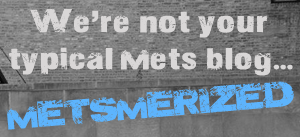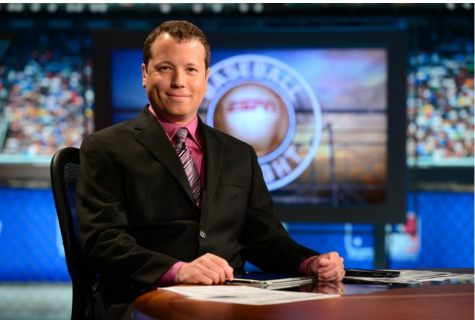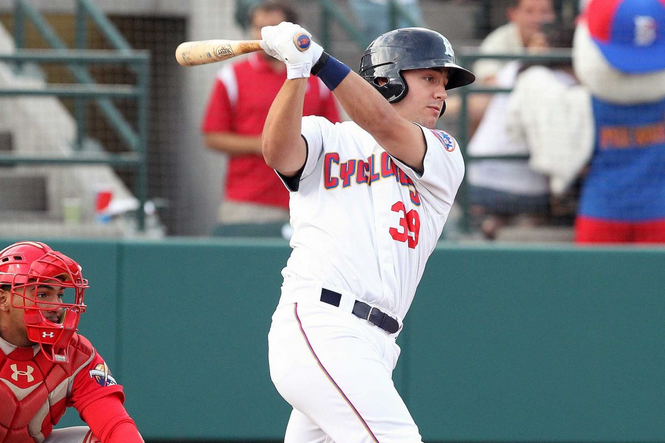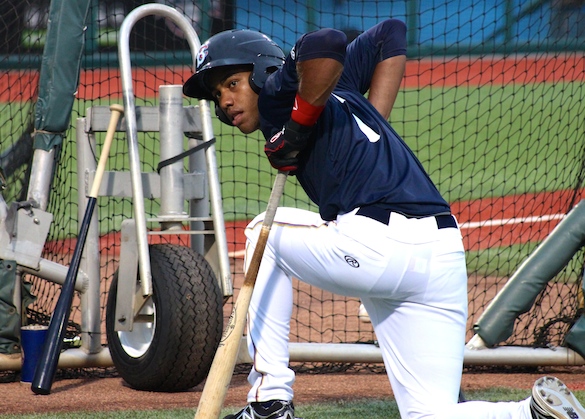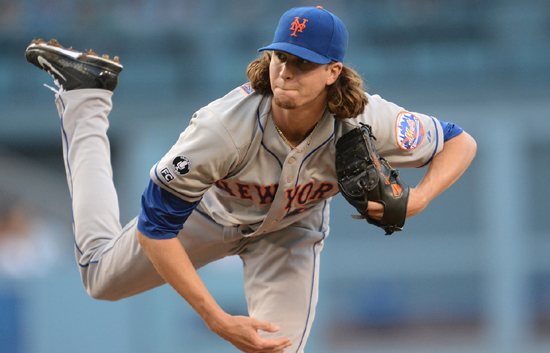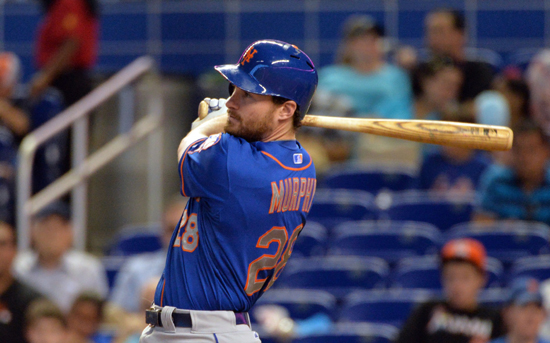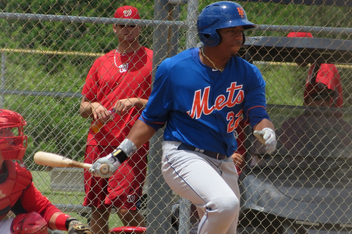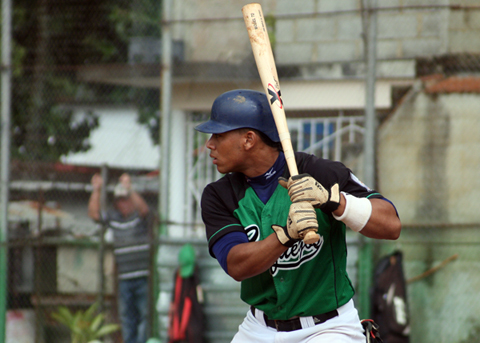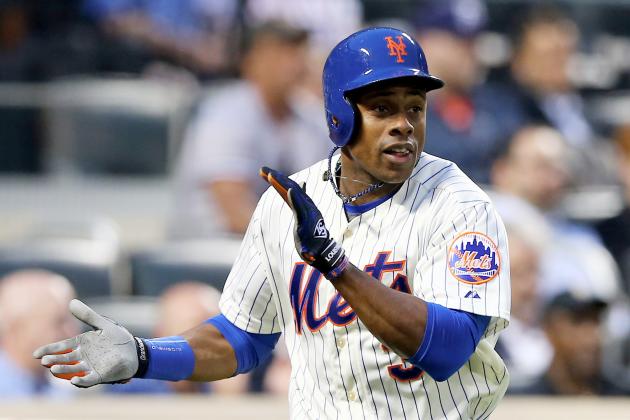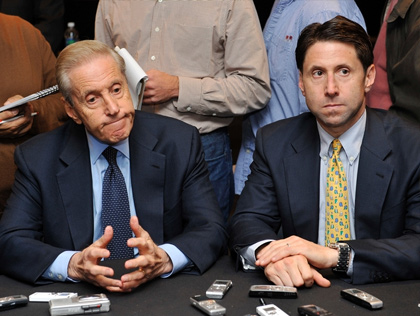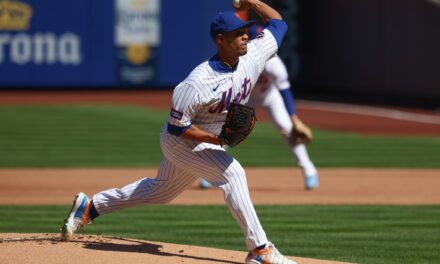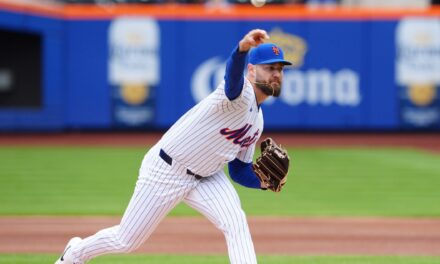
On Thursday morning, I had the chance to conduct an interview over the phone with ESPN senior baseball analyst Keith Law, who is also the lead baseball analyst for ESPN’s Scouts.Inc and the former assistant to the GM of the Toronto Blue Jays.
Keith, who ranked the Mets as having the fourth best farm system in the MLB before our interview and named six Mets in his Top 100 prospects article shortly after our interview, was kind enough to take several questions. Check out what we discussed, including the prospects, trades, the shortstop situation, the money, the upcoming season, and, of course, the future!
Tommy Rothman, MetsMerized Online: Hey Keith. So first of all, thanks so much for agreeing to do this interview.
Keith Law, ESPN: No problem, happy to do it.
Rothman: I guess we’ll start with your farm system rankings, the Mets are ranked number 4. When you rank farm systems, how deep does it go? Because obviously we all know about Noah Syndergaard, Steven Matz, et cetera, but are you just ranking teams on their top guys? How deep do you go into the system when you do these rankings?
Law: What I do for each team— and this will be up on Friday— I do team reports where I do at least 10 prospects per team, but I’ll keep going through the team, maybe as many as 20 guys depending on the system. I go as far as I believe that there are players with potential Major League value. In the Mets’ case, it’s pretty deep. There’s probably 17 or 18 guys there who I think have a legitimate shot at some kind of Major League role. Not necessarily all starters, but there’s something there. To put in other words, you could see it as asset value… you could take a lot of these guys and trade them for something.
Rothman: So next let’s talk about the history of the Mets in your rankings. You did your first rankings in 2008, the Mets were 28th. 2009 they’re 17th, and you’re excited about Fernando Martinez, Wilmer Flores, Jefry Marte and Brad Holt. 2010, the last year of Minaya, we’re at 15, and you criticize their penny-pinching in the draft but praise their work in the international market. Sandy takes over heading into the 2011 season and starts off with a system you rank as 26th, again bashing the Wilpons for not spending in the draft. The next year Sandy gets us to 22nd, of course we know about the Beltran trade. Then the Dickey trade, and we’re 14th. 2014, we’re 6th. Now here we are, and we’re 4th despite not having many very high draft picks (unlike teams like the Cubs and Nationals). We know about the trades, but other than that, what has been responsible for the rebirth of the Mets system on a deeper level?
Law: I just think they’re drafting better. They’re drafting a lot better. You had the one year with (scouting director) Chad McDoland, now Tommy Tanous has taken over, he’s had a couple of drafts, and I just think they’ve drafted a lot smarter, especially towards the top. We’ll see if some of the later picks work, they’ve had some later picks that were interesting, those often take a little longer to percolate and show that there’s real value. But I think that they’ve clicked on most of their high picks the last few years. I really loved the Conforto pick (in 2014), I think they got the best pure hitter in the draft class. And that’s the kind of player they just didn’t seem to be taking previously. It’s hard for me to really characterize what the draft strategy was under (Omar Minaya’s) regime because I never really got it (laughs), I never understood it. Now, they’re doing a better job of just saying “who’s the best player on the board? We’ll take that guy.” They’re not trying to trick anybody, or trick themselves. Conforto was the best player on the board, they didn’t even think he’d be available for their pick, so they took him. That’s the way you should approach the first round. And then you look at the results of the last couple of drafts so far, it’s a nice mix of college and high school, upside and probability, that’s what you want to be getting out of your drafts… they’ve done a much, much better job with that.
Rothman: As you see in the rankings, there are some really good teams at the bottom, like the Giants and Tigers, and as you explain it’s because they use what they have. But the teams at the top aren’t that bad, the Cubs could be good this year, the Red Sox could be great. So having a good MLB team and a good farm system aren’t necessarily mutually exclusive. And the Mets have made it clear that they’re not going to gut the system and just “go for it” now, despite the angry fans and the billboards, they’ve made it clear that they’re not going to spend Yankee money, or Dodger money, or Pre-Ponzi Met money. So how do the Mets plan on taking this #4 farm system, a 79 win team, all the still-improving guys already on the Major League roster, and other boosts like Wright being healthy, and using the opportunity they now have to build a serious contender?
Law: Right. Well I think what they’re going to have to do at some point is trade some of this pitching depth for a bat. I love Conforto but it’s not like he’s going to help them this year. He alone, is not the guy who’s going to save the offense. They’re going to have to acknowledge that Wright is getting older, and that they’re probably going to need some beef-up somewhere in the lineup. First base, right field, it doesn’t have to come from a specific spot, but they don’t really have— other than Conforto— that guy. I almost said “shortstop,” but Amed Rosario I think is going to be a star, it’s just he’s a tick further away. So you don’t want to go out and necessarily get the guy who’s going to block him for the next six years, but you probably want to get a guy for the next three years, until he arrives. And that’s something I think they could do with all this pitching depth.
Rothman: But at the same time, if some great shortstop comes along, I don’t think they’d pass him up and say “no thanks, we have Amed Rosario.”
Law: No, of course. If someone’s gonna call and offer you the all-world shortstop… you know the problem is– I’ve always been a Troy Tulowitzki fan (note: Keith mentioned Tulo first, not me!), you don’t want him for the next eight years, though. You want him for the next three.
Rothman: Yeah. Another concern people have is, they have young guys like Harvey and deGrom and Wheeler and d’Arnaud and even Duda, but those guys will eventually be due for some real money, some sooner than others. So when the money gets serious, and it comes time to pay these guys, do you think they can and will do it? Or do you think they’ll be like the Rays and the Athletics, and start selling these guys off the moment money starts to be a real factor.
Law: I don’t think… they’re not in Rays and A’s territory where they’re just gonna have to move everybody. But my guess is, they’re not gonna keep them all. Some of those guys will get towards second or third-year arbitration and they’ll get up towards $10 million a year, and the Mets will decide to pass on some of them. You know that said, they kept Murphy who I thought they would deal because, why pay him $8 million dollars? That was kind of my guess talking to people in the industry. It’s a lot of money for a not-great player when you have Dilson Herrera, who probably could benefit from a little more time in the minors, but he could play 2nd base every day if you wanted him to.
Rothman: And at the same time, if they don’t want to keep them all, if they look at it and say, for example, “OK Wheeler’s the guy we’re not going to pay,” some of those guys have real trade value if they don’t want to hand out an extension.
Law: Oh yes, yes, absolutely. If you’re willing to trade a good young pitcher, going into his first or second year of arbitration, you’re going to get a lot. That could be a situation where they go and get “that guy,” the Addison Russell-type prospect in return, the high-upside hitting prospect who’s not that far off. Or maybe even you get the Wil Myers type. That’s a guy you never expect… if we had talked 3 months ago you’d say “he never gets traded” and now he has been. Things that we always assumed to be true are changing very quickly, I think because of the changing financial landscape in the sport.
Rothman: So talking about a specific guy… Wilmer Flores. A lot of people say the Mets botched their shortstop hunt, and well I guess you HAVE to say they did because they didn’t get a shortstop.
Law (laughing): You come home without a deer, then you did not have a good day.
Rothman: What’s debatable is whether they have a real problem or not, some people like Flores. He’s been around forever, he’s been on your radar since 2009, but he’s still young, he’s hit in the minors… so what do you think about Flores, and what do you think the METS think about him. Do they think he can be the answer, or are they putting on a poker face while they scramble to replace him?
Law: I think he can hit. I don’t think he can play short, I never even thought he was very good at third. I think there’s a real good chance he ends up at another corner, and my question then is whether the bat’s going to profile enough to warrant playing him every day, if he’s in left field or at first base. Again, I think he can hit, I think he’s got good hand-eye, I think his swing works, he’s gonna make a fair amount of contact, but it really hasn’t developed into any kind of power. He’s not very quick, not very athletic, but his feet… I’m very, very surprised that a team that’s clearly aware of defensive metrics would even TRY him at shortstop. I mean really, what are you expecting, running this guy out at short. So no matter what they say publicly, my guess is privately, we don’t wanna go out and spend on a shortstop, we don’t wanna trade the pitching depth yet, and this is the best of the internal options, none of which are good. I like Dilson Herrera a lot and I think he’ll be a good 2nd baseman. I wouldn’t put him at short either, he wasn’t good there. So unless you want another 150 games of Ruben Tejada, you know, you can’t put a pointed stake out there, somebody has to play.
Rothman: And it’s tough because you also have Murphy out there, it’s not like you have a gold-glove 2nd baseman covering up for him.
Law: No, there’s gonna be a lot of ground balls, not even just up the middle, but sort of on a whole 90-degree swing on either side of the base.
Rothman: So when it comes to making moves, the Mets have been sellers at the deadline since, well probably since Luis Castillo. Is this the year that you think they have to be buyers, and how serious do you think the buying could be? Could you see them pursuing a trade for a real game-changing player around July, somebody like a Tulo, or would it be like a 2nd-tier star or even less?
Law: I think that everything they’ve done and said so far indicates that they’re not going to do that. They’re not going to trade a bunch of the young guys to get a veteran, to get an established, older Major League player. I think if the opportunity came up to get the Myers type, the young player who’s in his peak years or they’re still ahead of him, where the money hasn’t gotten big yet, I think that they would do something like that. So they’re opportunistic, but not in a mode where they’re going to say, “yes, we’re going to go get that guy.” And I think part of it is, they’re not likely to win the division. They’re going to have a respectable team this year, but how many games would you say there are on paper right now between them and the Nationals?
Rothman: A lot.
Law: Yeah, and I mean it’s too much for me to say that they’re going to go into the season and plan to be buyers. Obviously they could beat expectations, and something could go wrong with the Nationals, but right now just looking at the clubs, as they’re constituted now, I’d have a very hard time anticipating being flat-out buyers, willing to trade a Steven Matz and something else, to go get the older player in July.
Rothman: And maybe they’ll find themselves within a game or two of the Nats in July, but with the new wild-card format, where you only get one game in the playoffs unless you win the division, it’s tough to justify “going for it.”
Law: I totally agree. It’s foolish when teams do that, because if you look at the number of teams that treat themselves as contenders, and the number of teams that can actually make that wild-card, it doesn’t really add up.
Rothman: So going back into the farm system, we know about the top guys like Noah, Matz, Plawecki, Nimmo and such, you mentioned that you think Rosario can be a difference-maker, how about some other guys who are farther away, like Dom Smith, how long would it take him to get to Flushing?
Law: Those guys are in my top 10 for them, I still love Dominic Smith, I understand he only hit one home run for them, Savannah has turned out to be a brutal place for left-handed power hitters. I loved him in high school, and I talked to people about him. He really worked on just going the other way, recognizing he’s not going to be able to pull the ball out, so why not focus on making a whole lot of contact, and really using the whole field, particularly going to the opposite field. Which is a great thing for a young hitter to do, it’s just not going to produce a pretty stat line. So if you’re just going to scout the stat line, you’re going to think he’s terrible, a first baseman with one home run. I believe he’s got plus-plus raw power, at some point I think it’s going to surface, you’ll probably see more of it this year in St Lucie, even more the next year in Binghamton once he gets out of those pitcher’s parks. But I do believe that their best chance for a first baseman of the future is currently in the organization.
Rothman: And Gavin Cecchini, is he still a prospect or can we look past him at this point?
Law: Cecchini, well, the issue is, Rosario’s just a better prospect. Rosario’s a star, he’s in my top 100. Cecchini, he’ll play for somebody because he can play shorstop (in the field). He’s not a lock to be an average regular, there are still a lot of variants as to how he turns out. At some point, the Mets will have to make decisions that will probably end up favoring Rosario over Cecchini, because Rosario has a chance to move very quickly through the system due to his bat. Not even because he has such an advanced approach, he’s just so… he’s just so freakishly talented. I have a feeling they’re going to have to push him a put more quickly through the system to get him to the point where he’s appropriately challenged by pitching.
Rothman: So Rosario’s ETA…
Law: I’d say three years. He was in short-season ball all summer, he’ll go to Savannah and hit one home run because that’s how it works (laughs). Well, he’s right-handed so maybe he’ll hit more, but it’s funny, he doesn’t just have pull power, he has power all the way out to right-center, where in Savannah it’s a double to the wall at best. That’s going to be frustrating for him. Going through the four levels of the minors, I could see him doing it in three years, maybe two-and-a-half if he’s just as gifted as I believe he is. The swing, bat speed, it’s all there, it’s just a matter of pitch recognition, ball-strike recognition… he doesn’t have a lot of pro at-bats yet. It’s not really that I know he needs it, it’s just that, I couldn’t tell you exactly how advanced that approach is.
Rothman: So with International free agency… the Mets used to be pretty good with that, like you said. But they sat on the sidelines for Tanaka and this latest Cuban wave. One of the Wilpons said they would have signed José Abreu if he had been an outfielder, which annoyed people. It was even more annoying when they passed on Yasmani Tomás, who IS an outfielder! And the biggest hole is shortstop, but it looks like they have absolutely no interest in being in the discussion for Yoan Moncada, who might sign a $30 million deal that really costs $60 million because of the double penalty. And it looks like he could very well end up with the Yankees, which kind of makes it worse.
Law: Of course.
Rothman: So this is the cheapest way both in terms of money and assets. You’re not trading the farm or giving away a ton of money to get an aging shortstop, you’re getting a pretty cheap young guy. But the Mets aren’t gonna do it. So first of all, do you agree with that consensus, that the Mets aren’t going to be in the discussion for him? And second of all, for the people who are saying “if they don’t get involved here, they’ll never get involved in international free agency,” because this is the time to do it… do you agree with that thinking?
Law: I don’t know if I could tell you whether they’ll never get involved in that market, sure I’d like to see them more aggressive in this market, but Moncada is not a Major League shortstop right now, and frankly everybody I’ve talked to who’s seen him live— I have not seen him live yet— does NOT see him as a shortstop, they think he’s gonna be way too big for it. So you can be upset as a Mets fan that they’re not more aggressively involved, and you wonder how much of that is due to the fact that they’re a team that just does not pay any sort of penalties ever. That’s the Wilpons, their kind of tacit agreement with Selig, that they would follow all his rules and not go into the penalty in the draft and international or anything. They follow Bud’s dictates. Now Bud’s not there anymore, and I don’t know if that’ll change, but that’s been their practice. And you can be upset that they’re not involved in Moncada because he’s extremely talented… but he’s not a shortstop, I don’t think he’s anybody’s solution at shortstop. You go after him because he’s got a chance to be an elite hitter, certainly a high-end prospect. From everyone I’ve talked to, it’s most likely third base.
Rothman: You mentioned the Wilpons. We have all this talk about the Wilpons, people saying they’ll never change, they’ll never spend, they’ll never leave, they’ll be a low-budget team that might win 84 a year but won’t spend what’s necessary to supplement the home-grown talent. So to the Mets fans looking to be convinced that the current front office is committed to putting a winning team, a REAL WINNING TEAM on the field in the reasonable future, what do you have to say? We’ve heard about “the plan,” but do you think the plan will be backed up with the necessary aggressiveness and, when appropriate, the necessary financial support?
Law: Yeah, I mean they spent for Granderson. It turned out to be a disaster, but at least they spent on the player. So it’s not like they’re not willing to spend anything. What I would question is, would they go out and get the $22 million player. Guys in that stratosphere. Will they do that? Because the Mets would have, 6 or 7 years ago. And frankly, they’re going to be at a point where getting that player is going to make financial sense. They’re going to put together, say, an 89-win team with homegrown talent, and they’re going to be at the point where getting that elite player makes them a 94-win team, which is a real playoff contender. So (them not spending there) would be frustrating… the Nationals window won’t last forever and the Mets will have a real chance in the next 3 or 4 years… now I don’t know for sure about the answer when it comes to the Wilpons, will they spend $22 million a year on the elite guy hitting free agency. If I were a Mets fan, that’s what I would be focused on. Because they’ve shown they’re willing to get the $12 million guy. You might not want them to do that, eventually you’re going to want them to get the 6-WAR player, one of those guys hits free agency every year and you want to make sure the Mets are going to do that, when it makes sense, when those 6 wins are going to put them into the playoffs.
Rothman: So if you had to give a number, in the next 6 years, how high could you see the Mets getting in terms of payroll rank?
Law: I could see them being top 10 but not top 5, I think that’s where they’ll peak. Yeah it would be better if somebody other than the Wilpons owned the team, but I’ll try to take a slightly optimistic view.
Rothman: And lastly, if you had to put a number on it, what do you think the Mets’ chances are of getting a playoff game this year?
Law: This year? Oh, ten percent or less. Because it’s wild-card only, and I don’t think they’re as good as some of those other contenders.
Rothman: So you see them being relevant…
Law: Yes, and I think they’re going to be very enjoyable to watch because there’s going to be a lot of home-grown talent on the field, but you’re really hoping Harvey comes back, and you might get half a season of production out of him but they’re not going to want to push him right away. I think 2016 is much more reasonable. And how much less likely are they to add a piece this July, when you really think they’re probably not gonna be contending for the division, are you gonna go spend and add a piece, when it’s really just competing for the one-game playoff. Just like you said earlier, I think you nailed exactly what the internal debate is gonna be, how far do they go when it’s just one game, and maybe not even a home game.
Rothman: Alright, so that’s all I have for you! Thanks so much for doing this.
Law: Yeah you’re welcome, thanks!
Rothman (to himself, after hanging up): Wait, did I just go a whole interview without asking about Juan Lagares?
* * * * * * * * * *
I would like to thank Keith Law for agreeing to this interview. I would also like to thank the people at ESPN’s PR department who made this possible. Keith and I had a lot to talk about, and I’m sure you guys will all have a lot to say in the comments. Start sharing those thoughts!
